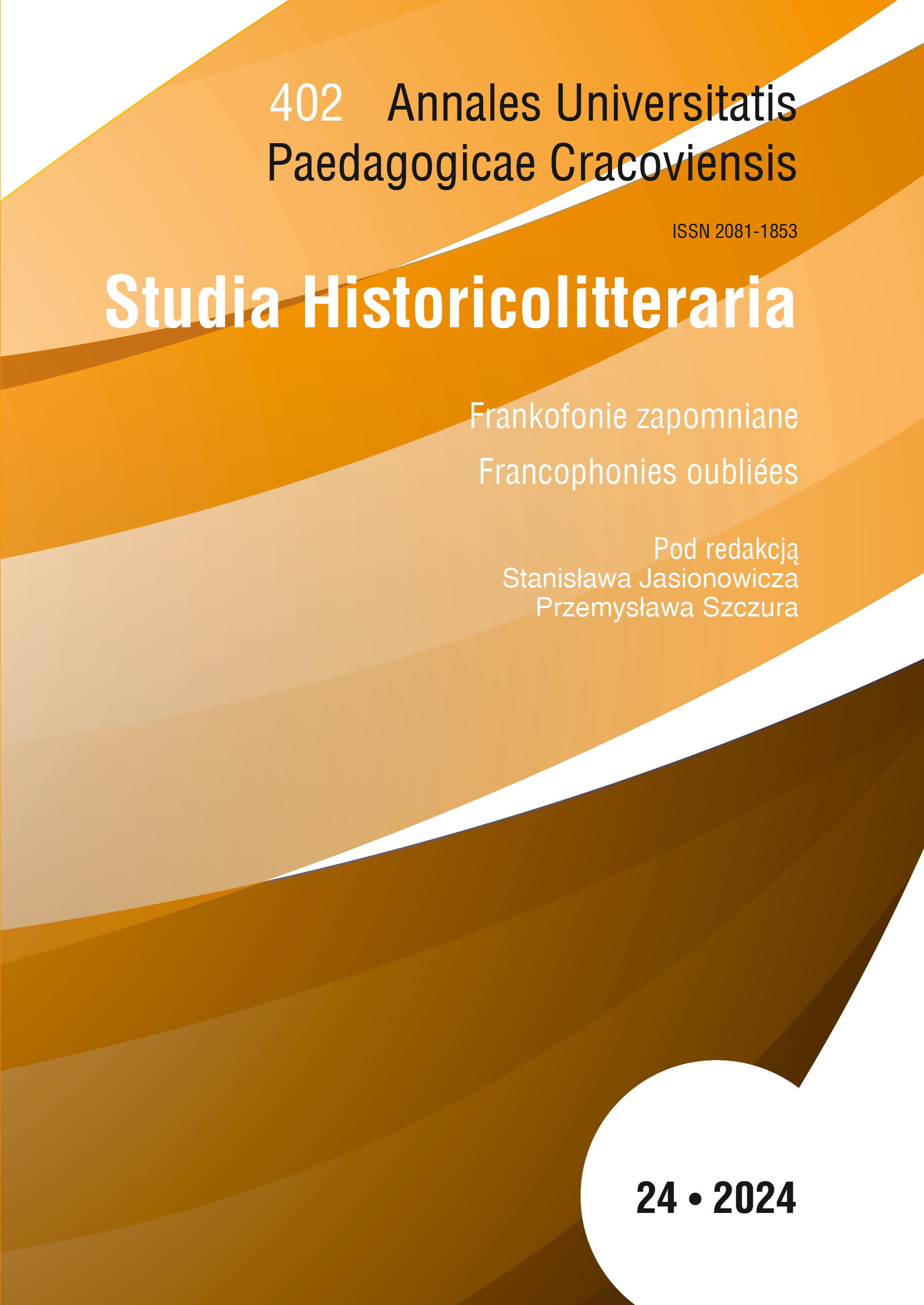Langue du travail et travail de la langue: l’exemple de deux francophones ouvriers
Hauptsächlicher Artikelinhalt
Abstract
In literature, labour is a topic as marginal as the Forgotten Francophones. Multidisciplinary subject, labour brings together literary, philosophical, political and socio-economic questions. This combination of disciplinaries is conducive to the decenter status of the Forgotten Francophonie. Forced to hit the road et idolizing the French literary culture, labour authors and Francophonie authors intersect with each other. Through their irregular position, with a literature of the “side step”, the language of work and the work with language go hand in hand and rejuvenate of the French literature. Jean Malaquais and Panaït Istrati create innovative works, ethically and esthetically speaking, by an entanglement of the authenticity of their experience, of poetic and labour. Where national proletarian literature sometimes turns to chauvinism, the Francophone labour
literature tries to represent labour et to give voices to the working-classes, in an international and corporal way. The analyzes of the connections between the poetic language and the labour theme in 'Les Javanais' (Jean Malaquais, 1939) and in the 'Cycle of Adrien Zograffi' (Panaït Istrati,1924–1933), because of the iterativity, the multilingualism and the realism renewal, enable us
to think back on their place in the literary French field of the interwar period.
Downloads
Artikel-Details

Dieses Werk steht unter der Lizenz Creative Commons Namensnennung - Nicht-kommerziell - Keine Bearbeitungen 4.0 International.
URHEBERRECHTE
Der Herausgeber der „AnnalesUniversitatisPaedagogicaeCracoviensis. StudiaHistoricolitteraria” ist zur Nutzung und Verbreitung aller in der Zeitschriftveröffentlichten Materialien auf Grundlage eines nicht ausschließlichen, zeitlich unbeschränkten Lizenzvertrags befugt, der im Voraus unbefristet mit jedem/r Autor/in des jeweiligen Werks für die im betreffenden Vertrag vereinbarten Nutzungsbereiche abgeschlossen wird.
POLITIK DES OFFENEN ZUGRIFFS
Die „AnnalesUniversitatisPaedagogicaeCracoviensis. StudiaHistoricolitteraria” sind eine Fachzeitschrift mit freiem Zugriff, dessen voller Inhalt kostenlos für Nutzer und Einrichtungen auf Grundlage einer nicht ausschließlichenCreativeCommons-Lizenz (CC BY-NC-ND 4.0) verfügbar ist. Die Nutzer/innen können die Artikel in dieser Zeitschriftohne vorherige Zustimmung des Herausgebers oder des/r Autors/in lesen, herunterladen, Kopien anfertigen, verbreiten, drucken oder zu Volltexten verlinken, insofern die Quelle des Zugriffs und der/die Autor/inder jeweiligen Publikation angegeben wird. Dies ist mit der BOAI-Definition des offenen Zugriffs konform (http://www.soros.org/openaccess).
Literaturhinweise
Ansellem G., Romain Gary, les métamorphoses de l’identité, Paris 2008.
Arasse D., Le Détail: pour une histoire rapprochée de la peinture, Paris 2009.
Basso M., Men at work: Rediscovering Depression-era Stories from the Federal Writers’ Project, Salt Lake City 2012.
Blinderman A., Critics on Upton Sinclair: Readings in Literary Criticism, Coral Gables 1975.
Coleridge S., Biographia Literaria, Edinburg 2014 [1817].
Deleuze G. et Guattari F., Capitalisme et schizophrénie. L’Anti-Œdipe, Paris 1972.
Genette G., Figures III, Paris 2014.
Gnocchi M. C., Du paternalisme romantique aux « illégitimes légitimes »: stratégies de légitimation des écrivains populaires et autodidactes (1830–1939), [dans:] Légitimité, légitimation, éd. S. Amedegnato, S. K. Gbanou et M. Ngalasso-Mwatha, Pessac 2011,
p. 127–140.
Higgins G., Les Conrad français, « Les Nouvelles littéraires », 6.04.1940, n° 912, p. 4.
Istrati P., Codine [1926], Œuvres, t. 1, Paris 2006, p. 547–644.
Istrati P., Le Pêcheur d’éponges [1930], Œuvres, t. 2, Paris 2006, p. 95–186.
Istrati P., Roule-Bosse ou Lénine et l’homme de la rue [1929], « Cahiers Panaït Istrati », 1986, n°1, p. 7–16.
Kristeva J., Étrangers à nous-mêmes, Paris 1988.
Malaquais J., texte inédit, sans titre ni date, Archives Jean Malaquais, Harry Ransom Center, container 3.10: « Untitled and unidentified, French handwritten and typescript drafts, 1936–1941, undated. »
Malaquais J., Les Javanais, Paris 1939.
Malaquais J., Les Javanais, Paris 1995.
Noiriel G., Les Ouvriers dans la société française: XIX–XXe siècle, Paris 1986.
Paugam S., Les Salariés de la précarité, Paris 2007.
Pillon T., Le Corps à l’ouvrage, Paris 2012.
Pleuchot V., Les Javanais entre hier et aujourd’hui. Une comparaison des versions de 1939 et de 1995, [dans:] Malaquais entre deux mondes, éd. G. Nakach et J. Roumette, Paris 2017, p. 199–214.
Pleuchot V. et Roumette J., Introduction. Le chaînon manquant de l’histoire littéraire française du XXe
siècle, « La Revue des lettres modernes », 2021–8, n° 3, p. 11–30.
Sapiro G., Réseaux, institution(s) et champ, [dans:] Les Réseaux littéraires, éd. D. De Marneffe et B. Denis, Bruxelles, 2006, p. 44–59.
Sinclair U., La Jungle, trad. A. Sayez, Paris 2011.
Sobel R., Phénoménologie du travail, ontologie de la vie et critique radicale du capitalisme. Réflexions à propos du statut de l’interprétation de Marx par Michel Henry, Cahiers d’économie politique, 2009, vol. 56, n° 1, p. 7–40.
Uexküll J. Von, Mondes animaux et monde humain, trad. P. Muller, Paris 1984 [1934].
Zéphir F., Le Vagabond du monde ou le cosmopolitisme de Panaït Istrati, [dans:] G. Bridet
et alii, Décentrer le cosmopolitisme : enjeux politiques et sociaux dans la littérature, Dijon 2019, p. 115–127.
